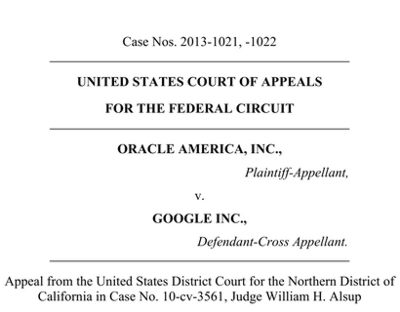| Are APIs Copyrightable? Computer Scientists Urge Court To Say No |
| Written by Sue Gee |
| Saturday, 01 June 2013 |
|
It is just a year since Judge Alsup found in favor of Google in its lawsuit against Oracle over Android with his ruling that APIs are not subject to copyright. This ruling is now on appeal to the US federal court and over thirty prominent computer scientists have filed a brief urging the court to uphold Judge Alsup's finding. On May 31st the Electronic Frontier Foundation filed an amicus brief on behalf of thirty two computer scientists arguing that APIs that are open are critical to innovation and interoperability in computers and computer systems. According to Wikipedia, amici curiae (literally friends of the court) offer information to the court that bears on a case but that has not been solicited by any of the parties involved; and an amicus brief is: a way to introduce concerns ensuring that the possibly broad legal effects of a court decision will not depend solely on the parties directly involved in the case. It its introduction the brief states: The freedom to reimplement and extend existing APIs has been the key to competition and progress in the computer field—both hardware and software It backs this up with diverse examples: the spread of affordable PCs was made possible because IBM held no copyright on its BIOS system, allowing competitors to build PC clones; the open nature of APIs was also essential to the development of the Unix OS, the C programming language, the open protocols on the Internet and cloud computing. The brief goes on to argue that the fact that interfaces are uncopyrightable gives developers the freedom to create novel software and that copyrighting APIs would not only block innovation but would make different systems incompatible. Another argument is that copyright in interfaces would create an "orphan software problem" which would disproportionately affect the public sector. You can read the complete 36-page testimony by clicking below to download a pdf:
The list of amici curiae who have produced the document, on page ii) reads like a who's who of the industry, with representatives from academia, professional bodies and commercial companies. It includes the creators of several programming languages: Bjarne Stroustrup (C) Brendan Eich (JavaScript) and Martin Odersky (Scala). In case there are names you don't immediately recognize, there are biographies of all 32 of them on the EFF site. So will the Federal Court by sufficiently impressed to take notice? Perhaps they hardly need to be swayed.
Judge William Alsup of the Northern District of California ruled May 2012 that APIs are not subject to copyright. Judge Alsup's original ruling appeared to many (including I Programmer) to be well argued both in legal terms and in its computer science - it transpired that the judge, who has a degree in mathematics, understood the technical issues at the heart of this case. He revealed that he already had some knowledge of programming, and had written code, and during the course of the case extended his knowledge of programming languages to include Java. The role of the expert and expert testimony has been tarnished in some fields by the overconfidence in what is known. In this case, however, the issue is not only about technical matters it is about how the law is written and applied. In this case the experts, us programmers, aren't equipped to know what impact making or not making APIs copyrightable would have. In many ways it would be much better if a tech-savvy judge asked experts the questions that need answering to ensure that the law is applied correctly and fairly.
More InformationComputer Scientists Urge Court to Block Copyright Claims in Oracle v. Google API Fight Amicus brief of computer scientists Related ArticlesJudge Rules Oracle's Java APIs Not Copyrightable Oracle v Google Judge Is A Programmer! Oracle Argues - Software Is Fiction
To be informed about new articles on I Programmer, install the I Programmer Toolbar, subscribe to the RSS feed, follow us on, Twitter, Facebook, Google+ or Linkedin, or sign up for our weekly newsletter.
Comments
or email your comment to: comments@i-programmer.info
|
| Last Updated ( Saturday, 01 June 2013 ) |




